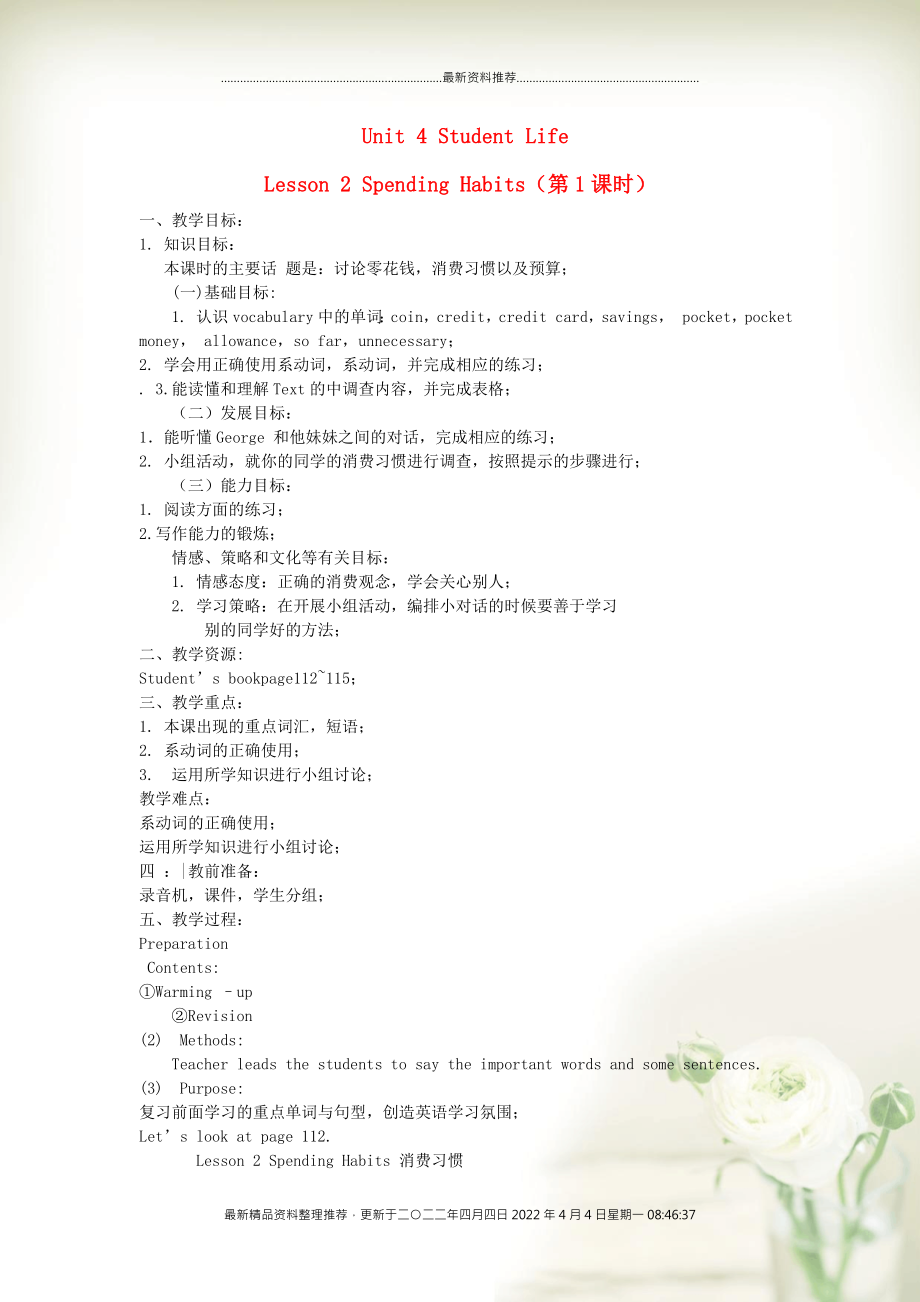《【金識源】九年級英語上冊 Unit 4 Lesson 2 Spending Habits(第一課時(shí))教學(xué)設(shè)計(jì) 上海新世紀(jì)版》由會員分享�,可在線閱讀�����,更多相關(guān)《【金識源】九年級英語上冊 Unit 4 Lesson 2 Spending Habits(第一課時(shí))教學(xué)設(shè)計(jì) 上海新世紀(jì)版(3頁珍藏版)》請?jiān)谘b配圖網(wǎng)上搜索��。
1、……………………………………………………………最新資料推薦…………………………………………………
Unit 4 Student Life
Lesson 2 Spending Habits(第1課時(shí))
一���、教學(xué)目標(biāo):
1. 知識目標(biāo):
本課時(shí)的主要話 題是:討論零花錢,消費(fèi)習(xí)慣以及預(yù)算�����;
(一)基礎(chǔ)目標(biāo):
1. 認(rèn)識vocabulary中的單詞:coin���,credit����,credit card��,savings��, pocket����,pocket money, allowance����,so far���,unnecessary;
2. 學(xué)會用正確使用系動詞�,系動詞,并完成相
2��、應(yīng)的練習(xí)���;
. 3.能讀懂和理解Text的中調(diào)查內(nèi)容�����,并完成表格��;
?。ǘ┌l(fā)展目標(biāo):
1.能聽懂George 和他妹妹之間的對話�,完成相應(yīng)的練習(xí);
2. 小組活動��,就你的同學(xué)的消費(fèi)習(xí)慣進(jìn)行調(diào)查��,按照提示的步驟進(jìn)行�;
(三)能力目標(biāo):
1. 閱讀方面的練習(xí)�;
2.寫作能力的鍛煉���;
情感、策略和文化等有關(guān)目標(biāo):
1. 情感態(tài)度:正確的消費(fèi)觀念��,學(xué)會關(guān)心別人�����;
2. 學(xué)習(xí)策略:在開展小組活動��,編排小對話的時(shí)候要善于學(xué)習(xí)
別的同學(xué)好的方法�����;
二����、教學(xué)資源:
Student’s bookpage112~115��;
三�、教學(xué)重點(diǎn):
1.
3、 本課出現(xiàn)的重點(diǎn)詞匯����,短語����;
2. 系動詞的正確使用��;
3. 運(yùn)用所學(xué)知識進(jìn)行小組討論���;
教學(xué)難點(diǎn):
系動詞的正確使用�;
運(yùn)用所學(xué)知識進(jìn)行小組討論��;
四 :|教前準(zhǔn)備:
錄音機(jī)��,課件���,學(xué)生分組����;
五�、教學(xué)過程:
Preparation
Contents:
①Warming –up
②Revision
(2) Methods:
Teacher leads the students to say the important words and some sentences.
(3) Purpose:
復(fù)習(xí)前面學(xué)習(xí)的重點(diǎn)單詞與句型�����,創(chuàng)造英語學(xué)習(xí)
4、氛圍����;
Let’s look at page 112.
Lesson 2 Spending Habits 消費(fèi)習(xí)慣
This lesson is mostly about the Spending Habits, how do you spend your savings, the teacher can ask one student to say how he spends his or her savings.
Let the students look at the following pictures, and ask two students to read
5、the sentences to the class. And look at the four questions.
For the four questions, ask four students to answer. Every student answers one of them.
The answers are:
In the piggy bank.
To donate his savings to the Red Cross.
She is buying books.
By credit card.
Text. The journalists from No.1
6����、 High School newspaper conducted a survey of students’ opinions about pocket money. Following is part of the information they have gathered.
Now, let the students read the passage carefully, then ask two students to say how Mary spends her savings, and the other student to say how Wang Hui spends h
7、is savings.
Now the teacher read the text again alone , then changes the text into Chinese, and ask them to pay attention to some phrases and sentences.
1) cut down, 削減���,減少;cut it/ them down;
2)so far���, 到目前為止�����;
3)a sense of independence; 一種獨(dú)立感
4) keep doing 堅(jiān)持做沒事�����;
5)It is adj for sb to do st
8���、h; 做沒事對某人來說是怎樣的;
6) the rest 其余的,剩余的部分���;the rest 后面的動詞由前面提到的名詞的單復(fù)數(shù)來確定�����;
4. Now let us begin the Comprehension Check.
1) Complete the following table according t to the text. The teacher asks the students read the text again and then complete the table. When the students are doing, the teacher sho
9�、uld move around the classroom in order to give those necessary help.
The answers are:
Mary: £15, 20%, mobile phone, books, £3��,independence, convenient;
Wang Hui: RMB 120, food, drinks, 20%, manage the better, 120yuan.
Now let’s look at the DISCOVERING LANGUAGE.
Linking Verbs�,連系動詞;
句中含有系動詞時(shí)��,句子結(jié)
10�����、構(gòu)應(yīng)該是:
主語+系動詞+表語�����;表語可以是形容詞�,名詞,動詞的過去分詞等���;
Now let’s complete the following sentences with the given words, and the answers are not only. Let the students do this part, when the students are doing, the teacher should move around the classroom and give some students necessary help. When the students com
11��、plete it , the teacher asks five students to say their answers to the class.
The answers maybe are:
2.became, 3. smell/taste, 4. look, 5. feels. 6. is /sound, 7. turn, 8. becoming, 9. are/become;
And then let’s look at the questions below:
What kind of words do we use after the Linking Verbs
12�����、in the above sentences? 上面的句子中系動詞后面是什么詞��?
Now let’s look at the sentences together, 1. 后面是名詞��;2 后面是名詞�;3 后面是形容詞,4��、5����、6�、7、8���、9 后面都是形容詞.
六�����、板書設(shè)計(jì):
Lesson 2 Spending Habits
一���、1) cut down, 削減�,減少���;cut it/ them down;
2)so far��, 到目前為止�����;
3)a sense of independence; 一種獨(dú)立感���;
4) keep doing 堅(jiān)持做沒事;
5)It is adj for sb to do sth; 做沒事對某人來說是怎樣的�����;
二����、Linking Verbs,連系動詞����;
主語+系動詞+表語�����;表語可以是形容詞���,名詞,動詞的過去分詞等��;
七��、Homework:
Recite the phrases on the blackboard.
八����、 教學(xué)反思:
同學(xué)們對于系動詞的運(yùn)用掌握的較好,對于系動詞后面詞的種類個(gè)別需要繼續(xù)鞏固.
最新精品資料整理推薦�����,更新于二〇二二年四月四日2022年4月4日星期一08:46:37
 【金識源】九年級英語上冊 Unit 4 Lesson 2 Spending Habits(第一課時(shí))教學(xué)設(shè)計(jì) 上海新世紀(jì)版
【金識源】九年級英語上冊 Unit 4 Lesson 2 Spending Habits(第一課時(shí))教學(xué)設(shè)計(jì) 上海新世紀(jì)版

